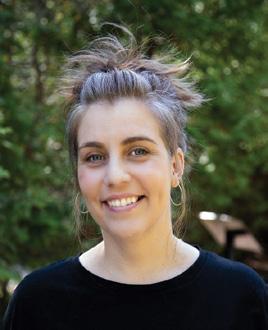
4 minute read
Waiting and the call
Knowing full well she will walk that fire again someday soon. The next time she is not fast enough, next time she doesn’t understand, next time the instructions move too fast and there is no visual to support the need, next time her body is filled with pain from an unknown source, next time…
I wait. With one hand on my cup and the other open in my lap, I wait.
I wait because I know this woman has had a particularly terrible day and in this moment all of her processing systems have gone dark. She is unable to find her words, so she doesn’t try. She is unable to coordinate her body to drink her tea, so she leaves it. With me there is no need for her to attempt, she knows I will wait. She huffs under her breath, venting energy from her body. I see the napkin in her hands twisting, twisting, twisting.
This is the time when it starts to get uncomfortable. What is she thinking?
Should I interrupt this silence with a prompt? Should I ask a question? I am thinking frantically to myself, “Has she actually fallen asleep?” Inwardly running scenarios and then knowing my only role here is to witness.
In my mind I draw my mentors and guides in and hear them assure me that complex communication wants time and a neurology different to mine requires curiosity. My waiting is respectful and open and it goes on a really, really long time.
And then the sobs erupt like a tidal wave on the shore, chaotic and deep. The tears come and roll and I startle when I realize some of them are indeed mine. The choked words, “I had a bad day…” garbled and barely perceptible at the end “…never good enough.”
Her truth in this moment settles heavy in the room. We sit until the tea is stone cold and we have cleaned our faces and cleared our energies. With breath, space and remembering she is able to once again access her felt sense of enough.
Through the fire she walks, just one more time.
To live in the world as a woman with a neurodiversity is an adventure of a momentous kind. A neurodiversity is a brain difference. Brain differences show up in lots of ways: at birth, from an acquired source, from a trauma, or maybe a genetic reason. Neurodiversity impacts the way humans experience the world from a perceptual and physical sense. Like so many things about humans, neurodiversity is on a spectrum; they are totally unique to the person and have barriers plus gifts.
I’ve spent a lot of time with neuro divergent women but, I don’t speak or write for them. I do pay attention to what I learn from the other humans in my life. I hold space with and I trust these people as advisors. Here is what I know but to find out you must come slowly and gently.
Join me for a wander as I tell you about the minds among us that are so beautifully unique and especially brilliant. Don’t hold your breath—as flow is most important here in this place where time means a little less and the moment means a little more.
If you journey back you will recognize my early fears around people with “differences” and then watch as over years, I was taught brand new ways to love. Everyone told me I was working with “the vulnerable,” when in fact it was quite the opposite—I was the vulnerable and you taught me:
That being authentic to self is one of the most courageous things we can be and that the human spirit is not to be doubted. Ever. Through your eyes you told me what it is like to have a body that doesn’t always listen and how sometimes that crushes your heart. With your hands you taught me to be tender and with your wisdom I have learned how to be with my own broken heart. You don’t always use words and every day I practice listening in other ways. But even still, with you I have become enough.
As our human collective learns more about the brain, mind and spirit we will no doubt make some amazing discoveries about the truth of neurodiversity; the depth, width and breadth of it—the brilliance and ways to make the world safer for people who are neuro divergent.
But for now I’m going exploring into my own heart and I hope that you will come too.
The path will lead me to the centre where I will remember that we are all the woman who whispers the words “not good enough” and we all require, at times, another soul to show us the way home.
This is a call to connect with the woman who is different. This is a call to deeply understand what offering her a seat at the table (if she wants one) means and then listening to her story. This is a call to ask gentle questions and be curious with other women about if there are barriers and if those barriers may be neurological and could be supported differently. This is a call to hear women who don’t talk with words, and see women as spirits, not bodies. This is a call for patience and when you need to: to wait.
In these moments we reach out and touch a common humanity in which we access a spark of the divine. In the moments that we humbly wait we will identify the space where the beautiful concoction of vulnerability, courage and love meet and we evolve.
Kimberly Van Ryn is a neuro-diverse human and the founder of Branching Out Support Services Inc, a yoga teacher and trauma informed practitioner. Blending her background in Child and Youth Work, energetic practices, and trauma-informed principles, she is constantly curious about the human mind, brain and heart. More about Kim, her team and their unique style of practice can be found at www.branchingoutsupportervices.ca








